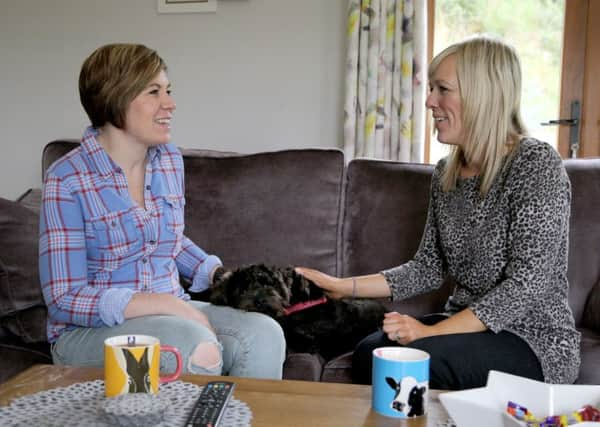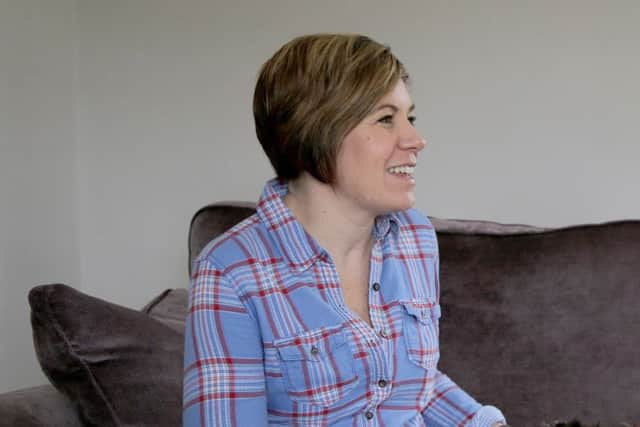CLODAGH DUNLOP: Silently screaming for escape from a life locked in


It was Easter Monday last year, and the policewoman was at home in the beautiful bungalow on the outskirts of Desertmartin she shares with partner Adrian and their adorable six month old miniature schnauzer pups, Bonnie and Clyde, now curled up on the sofa between us, as she relates to me her story.
“I had a collapse the previous Wednesday night and was taken to hospital, but we thought the episode was an unexplained loss of consciousness because it was so out of the blue,” says the 37-year-old, who is originally from Magherafelt.
Advertisement
Hide AdAdvertisement
Hide Ad“On Easter Monday, I felt perfectly fine. I was going to go for a run. Then I looked out of the window and thought, do you know what, the sun is shining in and those windows need cleaned, I’ll just not bother going for a run.


“I felt so physically well that I cleaned all the windows in the house. Then I thought, it’s Easter Monday, I’ll sit here and have an Easter egg.”
Seconds later, Clodagh noticed her sister Diane pulling up at her gate, and got up to hit the buzzer in the kitchen which would open it. Then, the unthinkable.
“Suddenly I felt like I was dying,” she says. “It wasn’t even a feeling that I was about to faint - it was this all-consuming feeling of death, and as I hit the button to open the gates and ran to get a phone, I was barely standing. I was falling all over the kitchen. I had no pain, I just knew that I was going to fall and desperately needed help.
Advertisement
Hide AdAdvertisement
Hide Ad“I got to the back door and Diane was standing there; I said to her, ‘phone an ambulance, I think I’m having a stroke, I’m not joking’.”


Clodagh was rushed to Antrim Area Hospital, where several hours later, she had a major stroke. Again, she can remember every detail of that horror, including saying goodbye to her family, before falling back on the table, her face ashen, her pupils dilated.
“Diane was screaming, ‘Clodagh don’t go, it’s not your time yet, you can’t leave me’, and hit my face. We both feel that if she hadn’t done this, I would never have come back. I remember white lights, and I knew I was dying at that moment. I remember thinking, I don’t want to die, but clearly this is happening and I have no choice. It was very peaceful, and I thought, I’ll go with these lights, but then Diane interrupted it all. I had a massive seizure. I remember being snatched from the lights and the peaceful place and back into my body, having convulsions and being sick and writhing around the bed.”
Then, everything went black. Clodagh was put into a medically induced coma, and woke up in intensive care. She was fully mentally alert, but completely paralysed, and as the hours turned to days, she realised that this was not due to the medication she was on, but was the result of the stroke, and how long it would last for, she had no idea.
Advertisement
Hide AdAdvertisement
Hide AdHer partner Adrian, however, quickly established that Clodagh could still hear him by developing a means of communicating with her through blinking.
“The first day in ICU he said to me, ‘Clodagh, are you there? Blink once if you are.’ I remember thinking, I can’t get this wrong, I have to let him know I’m here, so I made this huge effort and gave a long blink. He smiled back at me and said, you’re going to be OK.’ We established a system of blinks; one for yes, two for no, three for I love you, and four for you’re a moron.
“It kept me going, every day. The nurses would use it too.”
But the sheer frustration of not being able to communicate verbally, or move her own body, was at times too much to bear.
Seeing her own family members in such turmoil over her condition and not being able to comfort them was heartrending.
Advertisement
Hide AdAdvertisement
Hide AdWitnessing the concern of her father in particular, who came in to see her in ICU every day “looking so forlorn”, disturbed her.
“I had bought him a T-shirt from Gleneagles Golf Club, for his birthday, and gave it to him the night before her stroke. He wore it every day for 10 days when he came to see me! I wanted to shout out to him, ‘change your T-shirt, don’t be so sentimental!’ It was him who broke my heart most, he was the one I most wanted to tell, we will get through this.”
She also found it frustrating when nurses or visitors would come in to her room and, for example, turn off her fan, observing that it was chilly. Inside, Clodagh was screaming to convey to them how hot and uncomfortable she was - but they never heard a syllable. All they observed was her still form lying motionless on the bed. seemingly serene and calm. The inner anguish being experienced by her was simply invisible to the outside world. It’s what makes locked in syndrome, surely, one of the most cruel illnesses in the world; to be trapped inside your own body must be insufferable.
Clodagh also experienced terrible moments of listening to the pain and distress of the patients around her, and never being able to even call for help for them.
Advertisement
Hide AdAdvertisement
Hide AdShe describes the horror of, on one occasion, being forced to lie and listen to the sounds of an elderly man on her ward, who was, it transpired, dying. There was simply nothing she could do.
And she experienced something similar another time, when a woman close to her own age passed away surrounded by her devastated family. Clodagh could do nothing but lie and listen to the heartbreaking reality of their grief.
“As a human being, it’s awful to watch someone in distress and not be able to help. Even as a police officer, I have taken an oath to protect and preserve life, and here I was just watching a man pass away and I could do nothing, I couldn’t even get help.
“It goes against everything you are as a human being; you can’t comfort these people, or reach out to them or offer any sort of help at all, you just have to lie and listen to their heartache.”
Advertisement
Hide AdAdvertisement
Hide AdFinally, in May 2015, a turning point. It was her birthday, and best friend Karen Doran was coming to the hospital to treat her to an evening of girlie pampering.
It turned out to be a night neither of them would forget.
“Towards the end of the evening, I wanted to ask Karen to ask the nurses for my tablets,” recalls Clodagh. “ I started to spell out with my spell board ‘can you get me my tablets?’, but she finished at ‘table’, she didn’t let me complete the word.”
What followed was half an hour of confusion and frustration on the part of both women, as Clodagh desperately, internally screamed at her friend to be patient and allow her to complete her sentence, and Karen frantically tried to work out what it was sitting on the table that Clodagh needed.
Clodagh recalls that she felt more angry with her friend at that point than she had ever felt. Eventually, tensions reached breaking point, and, with Karen on the verge of tears, Clodagh let out the scream of her life.
Advertisement
Hide AdAdvertisement
Hide AdThis time - at last - she was heard. And not only did her scream escape, but she also managed to move her arms ever so slightly and sit up in the bed.
A physiotherapist came rushing into the room and began laughing and clapping, as the realisation of what had just happened hit them all.
Needless to say, Karen herself could hardly sleep for two nights due to the excitement of what had happened, and how significant it could be in her friend’s recovery.
“Karen set off the explosion that was needed to help me break out,” says Clodagh. “Ultimately, it was the best birthday present ever, and the best present ever, because she annoyed me more than anyone has ever annoyed me in my life. But without that happening, I might never have broken out. I will always feel grateful to her. We’ve been best friends through the good times and the bad times, but that was the ultimate moment in our friendship.”
Advertisement
Hide AdAdvertisement
Hide AdKaren, together with Clodagh’s partner Adrian and her family, continued to be a tower of strength throughout her recovery. Karen and Diane would visit the hospital routinely and do Clodagh’s hair, pluck her eyebrows, choose her outfits. And even though they often struggled themselves with seeing her unable to move or speak, they never showed their anguish in front of her.
“They were tremendous,” she says. But it was just the beginning for Clodagh; from then on, every day would be devoted to learning to walk and move all over again. I ask her what the most memorable ‘high points’ in her treatment were, and she refuses to single out any, stating that every step in her recovery - no matter how small - represented a victory for her.
“I always tell the story about when I brushed my teeth for the first time; I would sit at the sink in my wheelchair, brushing my teeth and crying, and when the nurses asked why, I would tell them I was just so happy I could brush my teeth.”
“And ultimately, when I was first able to have a conversation with someone.”